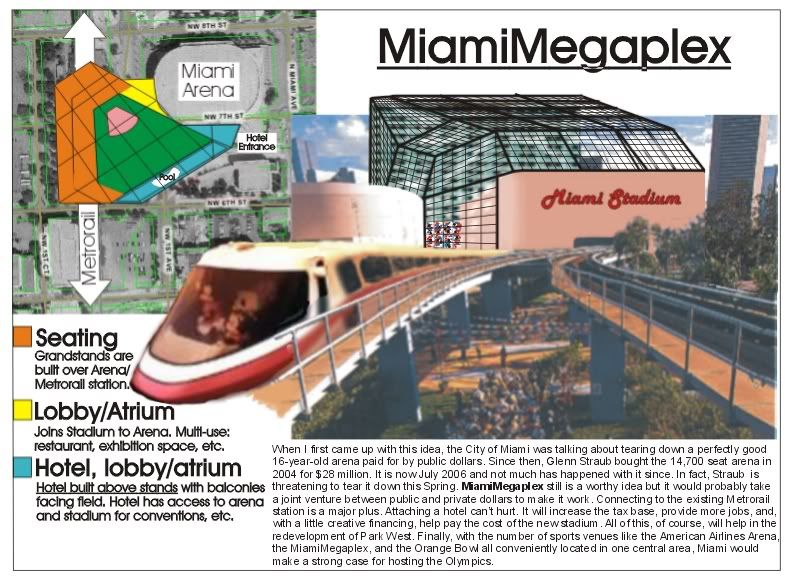Now that the front office of MLB has finally stepped up to the plate to help the Florida Marlins find a home in downtown Miami, maybe there's a chance that dream will finally come true. Up until that announcement, the only pitch left to swing at by the team was a landfill site out in godforsaken Hialeah. Although the proposed site is in downtown, it still could be better. Since 2003, I have been pushing for a location that ties in with the "old" Miami Arena. As you can see from the picture above, it is built over the North-South MetroRail line. Center field's wall is hundreds of hotel balconies and the entire stadium is enclosed (not shown: center field stadium seating fronting the hotel parking garage-- the hotel rooms and balconies extend over the stands).
Hey, it's only an idea and, until it becomes reality, it's pretty cheap. As a private/public project, splitting the costs 4 ways between the team, the hotel, the arena, and the county, should make it affordably real. Right now, business models are only split between the team and the county. Of course, a more semi-practical approach, would cover the field with a stretched fabric-- but I would not make any predictions how long that would last during a hurricane. Anyway, I like the enclosed field atrium. That means air-control (not necessarily "air-conditioning") which should make for a far more comfortable experience during the "mean season."
Other reasons the concept is worthy:
- It affords multiple use from rock concerts to tractor pulls with weather never becoming a factor,
- It can be used for conventions tied-in with the Miami Arena with extra exhibition space spilling out onto the field,
- It ties in with mass transit and,
- It prepares Miami for being accepted as a future host of the summer Olympics.
Think about it: Miami could schedule simultaneous Olympic events with gymnastics in the Miami Arena, basketball at the American Airlines Arena, baseball at the new downtown stadium, with soccer and track-and-field at the Orange Bowl. Plus, if my other idea became a reality, spectators could walk or take a MetroMover to Bicentennial Park to watch the surfing competition in the 24-hour wave pool off of Biscayne Boulevard (see the earlier blog entry "Miami: Surfing USA?"). Aside from the Orange Bowl, the two arenas, the new baseball stadium and the wave pool are all within walking distance. With a MetroRail line extended a short hop west from downtown to the Orange Bowl, no one would need a car to get anywhere-- and that alone makes this proposal worthy.
UpDate (7/27/08): Glenn Straub, owner of the Miami Arena, announces he will tear it down to build a baseball stadium-- if he can strike a deal with the City of Miami and the Florida Marlins. Part of the deal he wants is to gain title to the Orange Bowl site (now torn down) to build affordable housing. Initial reaction from the Marlins and the city: not interested. Typical. And surprising since at one time the Marlins insisted on a downtown site.

2 comments:
Your Orange Bowl idea sounds great, but it assumes that the city won't do what they said they're going to do and divert the Orange Bowl bond funds to the new Marlins stadium.
I fully support the idea of a downtown stadium, but I'm absolutely not willing to allow the city to spend a dime until they prove they can actually take care of a stadium that they own. The fact that the current debate over the Orange Bowl is happening, even after the people voted to fix it, is a perfect example of what's wrong with Miami politics.
I'd love the Marlins to have a stadium, and this idea is absolutely great, but I refuse to support any public money going to a Marlins stadium until repairs to the Orange Bowl are made.
I'm with you on saving the Orange Bowl but not taking care of city property is the norm. Look at the Marine Stadium. Perhaps money can be found to connect the Orange Bowl to the new downtown baseball stadium via a new line off of Metro Rail or the Metro Mover since both connect with MVB's choice of downtown locations. Both need to be connected to mass transit to survive in a world of ever-rising gas prices. In any event, not saving the Orange Bowl would be a crime-- as would UM dumping it for Joe Robbie Stadium.
Post a Comment